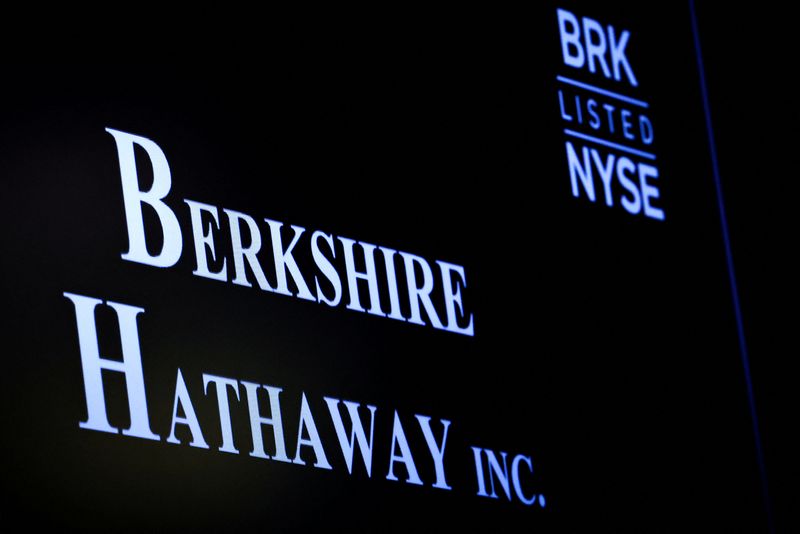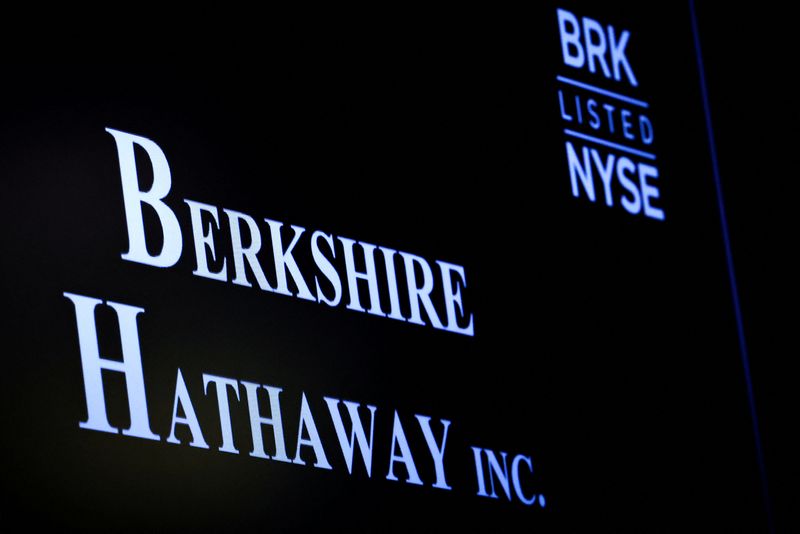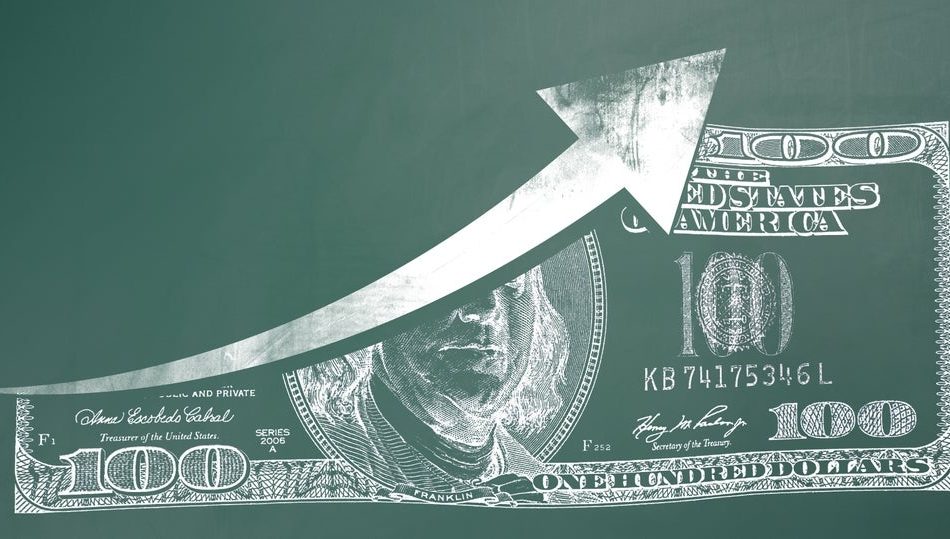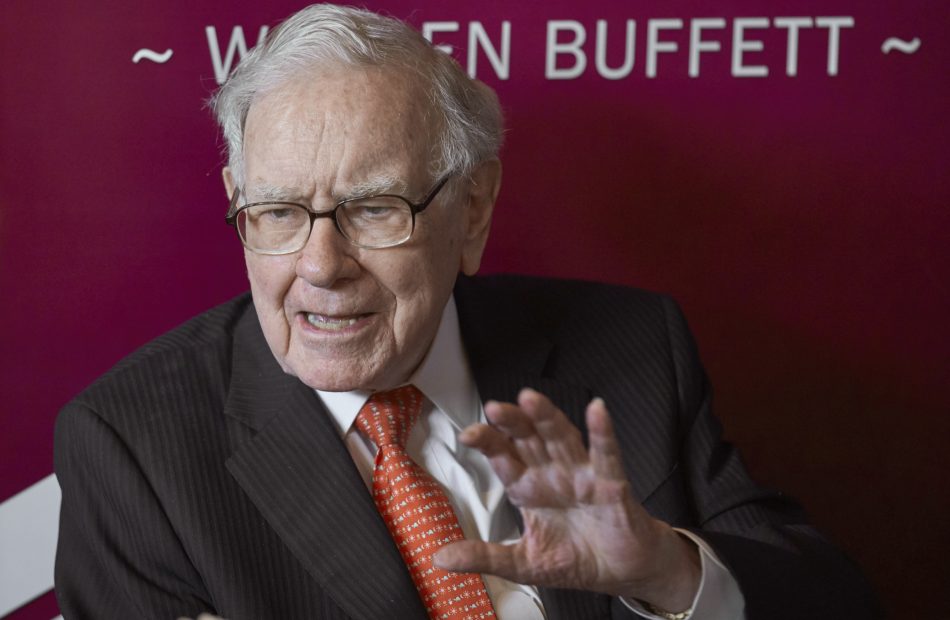Berkshire's cash soars to $325 billion as Buffett sells Apple, BofA; operating profit falls
By Jonathan Stempel
(Reuters) -Warren Buffett and Berkshire Hathaway extended their retreat from stocks in the third quarter, further slashing holdings in Apple and boosting cash to a record $325.2 billion.
In its quarterly report on Saturday, Berkshire said it sold about 100 million, or 25%, of its Apple shares over the summer, ending with about 300 million.
Berkshire has now sold more than 600 million of the iPhone maker’s shares in 2024, though Apple remained its largest stock holding, at $69.9 billion.
It sold $36.1 billion of stock overall, including several billion dollars of Bank of America shares, and bought just $1.5 billion.
That made the quarter the eighth straight where Berkshire was a net seller of stocks.
The Omaha, Nebraska-based conglomerate also conducted no stock buybacks for the first time since the second quarter of 2018, and did not repurchase stock in the first three weeks of October.
“Berkshire is a microcosm of the broader economy,” said Cathy Seifert, an analyst at CFRA Research in New York. “Its hoarding cash suggests a ‘risk-off’ mindset, and investors may worry what it means for the economy and markets.”
The Class A shares of Berkshire are up 25% this year, while the Standard & Poor’s 500 has risen 20%.
Rising valuations have fueled concerns among some investors that many stocks have become too expensive.
Berkshire’s cash stake grew from $276.9 billion at the end of June, and is more than 10 times the $30 billion cushion that Buffett has pledged to maintain.
Buffett has made no major acquisitions of whole companies for his $975 billion company since 2016.
Jim Shanahan, an analyst at Edward Jones in St. Louis, said the swelling cash hoard “begs questions about whether Buffett thinks stocks are overvalued or an economic downturn is coming, or is trying to build cash for a big acquisition.”
In May, Buffett said he expected Apple to remain Berkshire’s largest stock investment, but selling made sense because the 21% federal tax rate on gains would likely grow.
OPERATING PROFIT FALLS
Berkshire’s quarterly operating profit declined 6% to $10.09 billion, or about $7,019 per Class A share, missing analyst estimates of $7,611 per share according to LSEG IBES.
The decline stemmed largely from underwriting losses on older insurance policies, insurance claims related to Hurricane Helene in September, and currency losses from a strengthening U.S. dollar.
These offset improved profitability at the Geico car insurer, where accident claims fell. Profit also rose at the BNSF railroad, which shipped more consumer goods, and Berkshire Hathaway Energy, where operating expenses declined.
Berkshire's cash sets record as Buffett sells Apple, BofA; operating profit falls
By Jonathan Stempel
(Reuters) -Warren Buffett and Berkshire Hathaway extended their retreat from stocks in the third quarter, further slashing holdings in Apple and boosting cash to a record $325.2 billion.
In its quarterly report on Saturday, Berkshire said it sold about 100 million, or 25%, of its Apple shares over the summer, ending with about 300 million.
Berkshire has now sold more than 600 million of the iPhone maker’s shares in 2024, though Apple remained its largest stock holding, at $69.9 billion.
It sold $36.1 billion of stock overall, including several billion dollars of Bank of America shares, and bought just $1.5 billion.
That made the quarter the eighth straight where Berkshire was a net seller of stocks.
The Omaha, Nebraska-based conglomerate also conducted no stock buybacks for the first time since the second quarter of 2018, and did not repurchase stock in the first three weeks of October.
“Berkshire is a microcosm of the broader economy,” said Cathy Seifert, an analyst at CFRA Research in New York. “Its hoarding cash suggests a ‘risk-off’ mindset, and investors may worry what it means for the economy and markets.”
The Class A shares of Berkshire are up 25% this year, while the Standard & Poor’s 500 has risen 20%.
Rising valuations have fueled concerns among some investors that many stocks have become too expensive.
Berkshire’s cash stake grew from $276.9 billion at the end of June, and is more than 10 times the $30 billion cushion that Buffett has pledged to maintain.
Buffett has made no major acquisitions of whole companies for his $975 billion company since 2016.
Jim Shanahan, an analyst at Edward Jones in St. Louis, said the swelling cash hoard “begs questions about whether Buffett thinks stocks are overvalued or an economic downturn is coming, or is trying to build cash for a big acquisition.”
In May, Buffett said he expected Apple to remain Berkshire’s largest stock investment, but selling made sense because the 21% federal tax rate on gains would likely grow.
OPERATING PROFIT FALLS
Berkshire’s quarterly operating profit declined 6% to $10.09 billion, or about $7,019 per Class A share, missing analyst estimates of $7,611 per share according to LSEG IBES.
The decline stemmed largely from underwriting losses on older insurance policies, insurance claims related to Hurricane Helene in September, and currency losses from a strengthening U.S. dollar.
These offset improved profitability at the Geico car insurer, where accident claims fell. Profit also rose at the BNSF railroad, which shipped more consumer goods, and Berkshire Hathaway Energy, where operating expenses declined.
Batman Fan? You Can Now Score A Full Size Batmobile Replica For An Eye-Watering Price Of $3M
Wayne Enterprises Experience has 10 full-scale replicas of the famous Batmobile from The Dark Knight trilogy up for sale, each priced at nearly $3 million dollars.
What Happened: These Tumbler Batmobiles are officially sanctioned by Warner Bros Discovery and interested individuals can fill up a form on the Wayne Enterprises website to be considered for allocation, it said. Deliveries will be made 15 months from the time of deposit.
Wayne Enterprises Experience did not immediately respond to Benzinga’s request for comment on whether the vehicles are street-legal.
Features: The $3 million vehicle is painted black and has imitation gun turrets as in the movies. It has a 6.2L LS3 525 HP Engine and weighs about 5,511 pounds.
The body is made of Kevlar, carbon fiber, and sheet metal fiberglass and interiors have a 2-seat configuration. The vehicle will be available as a left-hand drive only.
Why It Matters: Wayne Enterprises is a luxury company providing products inspired by the world of the fictional billionaire Bruce Wayne, aka Batman.
It was formed through a collaboration between Warner Bros. Discovery Global Consumer Products and PR firm Relevance International.
Wayne Enterprises Experience works with other luxury brands to create collectibles such as highly exclusive versions of the Battista hyper GT and B95 hyper Barchetta inspired by the Batman series.
Check out more of Benzinga’s Future Of Mobility coverage by following this link.
Read Next:
Photo courtesy: Warner Bros Discovery
Market News and Data brought to you by Benzinga APIs
© 2024 Benzinga.com. Benzinga does not provide investment advice. All rights reserved.
Zillow Now Flags Richmond Homes For Climate Risk—Here's How It Could Change Property Value And Homeownership
Zillow recently introduced climate risk scores to its home listings, bringing increased attention to how environmental changes may affect real estate, including homes in Richmond, Virginia.
This addition follows similar moves from Realtor.com, which integrated weather-related risk factors earlier this year, acknowledging that extreme weather events, often linked to climate change, are becoming a significant consideration for buyers.
Don’t Miss:
According to a Zillow survey, climate risk now factors into the decisions of 80% of homebuyers, and a recent report by Realtor.com found that nearly 45% of U.S. homes face moderate to extreme damage risk from environmental threats.
For Richmond homes, climate risk primarily stems from high temperatures and high winds, with First Street—Zillow’s climate risk data partner—assigning most Richmond properties a score of 7 or 8 out of 10 for extreme heat risk.
This assessment is based on projections of days with “feels-like” temperatures reaching 107 degrees Fahrenheit or higher. Richmond experienced seven such days this year alone, but First Street anticipates a 129% increase in these extreme-heat days over the next 30 years.
Extreme heat can challenge homes by overloading HVAC systems and potentially damaging roofs, patios, and retaining walls. Additionally, very high temperatures may influence not only the durability of homes but also long-term maintenance costs, as First Street points out.
Richmond homes also show notable vulnerability to high winds, with First Street giving these properties a score of 6 out of 10. High wind events in the area are commonly driven by hurricanes and tropical storms, which generate wind speeds of 51 miles per hour or more.
Trending: Warren Buffett once said, “If you don’t find a way to make money while you sleep, you will work until you die.” These high-yield real estate notes that pay 7.5% – 9% make earning passive income easier than ever.
According to projections, most Richmond homes might experience severe windstorms over the next three decades—a sharp increase from the current risk of just 1%. Local structural challenges such windstorms pose emphasize the importance of preparing homes against this intensifying threat.
Homes in certain flood-prone neighborhoods like Shockoe Bottom, Virginia, face a significantly higher flood risk. Shockoe Bottom’s vulnerability stems from its low elevation and proximity to the James River, making it prone to rising waters during intense storms or heavy rainfall.
Despite this, flood insurance coverage in Virginia remains low—around 3% of homes statewide carry this type of insurance, although recent flooding from Hurricane Helene damaged about 126,000 homes according to a state report.
Zillow’s new climate risk feature isn’t just about identifying potential hazards; it’s also helping homeowners and buyers plan for rising insurance costs. Over the past few years, premiums have increased significantly, especially in areas vulnerable to climate risks.
According to research by the Wharton School, the cost of homeowners insurance has risen by 33% between 2020 and 2023 in high-risk areas, leaving many buyers to rethink their budgets.
Read Next:
Market News and Data brought to you by Benzinga APIs
© 2024 Benzinga.com. Benzinga does not provide investment advice. All rights reserved.
BFA Law has Sued ACADIA HEALTHCARE for Securities Fraud after Stock Plummets 16%; Contact the Firm before December 16 Class Action Deadline (Nasdaq:ACHC)
NEW YORK, Nov. 02, 2024 (GLOBE NEWSWIRE) — Leading securities law firm Bleichmar Fonti & Auld LLP announces that it has filed a lawsuit against Acadia Healthcare Company, Inc. ACHC and certain of the Company’s senior executives.
If you invested in Acadia Healthcare, you are encouraged to obtain additional information by visiting https://www.bfalaw.com/cases-investigations/acadia-healthcare-company-inc.
Investors have until December 16, 2024 to ask the Court to be appointed to lead the case. The complaint asserts claims under Sections 10(b) and 20(a) of the Securities Exchange Act of 1934 on behalf of investors in Acadia Healthcare’s securities. The case is pending in the U.S. District Court for the Middle District of Tennessee and is captioned Dyar v. Acadia Healthcare Company, Inc., No. 3:24-cv-01300. The lawsuit can be found here: https://www.bfalaw.com/siteFiles/Cases/Acadia_Dyar_Complaint.pdf
What is the Lawsuit About?
Acadia is one of the largest for-profit chains of psychiatric hospitals in the United States. The complaint alleges that during the relevant period, the Company misrepresented that its financial results were driven by insurance fraud and holding vulnerable people against their will in its facilities, including in cases where it was not medically necessary to do so.
On September 1, 2024, the New York Times published an article titled “How a Leading Chain of Psychiatric Hospitals Traps Patients.” The New York Times‘s “investigation found that some of that success was built on a disturbing practice: Acadia has lured patients into its facilities and held them against their will, even when detaining them was not medically necessary.” On this news, the price of Acadia stock fell $3.72 per share, or 4.5%, to close at $78.21 per share on September 3, 2024.
On September 27, 2024, Acadia disclosed that it received a request for information from the U.S. Attorney’s Office for the Southern District of New York, a grand jury subpoena from the U.S. District Court for the Western District of Missouri, and that it expects similar requests from the U.S. Securities and Exchange Commission related to the Company’s patient admissions, as well as its length of stay and billing practices. This news caused a significant 16% decline in the price of Acadia stock, from $75.66 per share on September 26, 2024 to $63.28 per share on September 27, 2024.
Then, on October 18, 2024, the New York Times published an article titled “Veterans Dept. Investigating Acadia Healthcare for Insurance Fraud,” stating that the Veterans Affairs Department is investigating whether Acadia is defrauding government health insurance programs by holding patients longer than is medically necessary. The New York Times also stated that several former Acadia employees in Georgia and Missouri have also been interviewed by agents from the F.B.I. and the inspector general’s office of the Health and Human Services Department. This news caused a significant 12% decline in the price of Acadia stock, from $59.32 per share on October 17, 2024 to $52.03 per share on October 18, 2024.
Click here for more information: https://www.bfalaw.com/cases-investigations/acadia-healthcare-company-inc.
What Can You Do?
If you invested in Acadia Healthcare you may have legal options and are encouraged to submit your information to the firm. All representation is on a contingency fee basis, there is no cost to you. Shareholders are not responsible for any court costs or expenses of litigation. The firm will seek court approval for any potential fees and expenses.
Submit your information by visiting:
https://www.bfalaw.com/cases-investigations/acadia-healthcare-company-inc
Or contact:
Ross Shikowitz
ross@bfalaw.com
212-789-3619
Why Bleichmar Fonti & Auld LLP?
Bleichmar Fonti & Auld LLP is a leading international law firm representing plaintiffs in securities class actions and shareholder litigation. It was named among the Top 5 plaintiff law firms by ISS SCAS in 2023 and its attorneys have been named Titans of the Plaintiffs’ Bar by Law360 and SuperLawyers by Thompson Reuters. Among its recent notable successes, BFA recovered over $900 million in value from Tesla, Inc.’s Board of Directors (pending court approval), as well as $420 million from Teva Pharmaceutical Ind. Ltd.
For more information about BFA and its attorneys, please visit https://www.bfalaw.com.
https://www.bfalaw.com/cases-investigations/acadia-healthcare-company-inc
Attorney advertising. Past results do not guarantee future outcomes.

Market News and Data brought to you by Benzinga APIs
© 2024 Benzinga.com. Benzinga does not provide investment advice. All rights reserved.
The 'Magic Number' Homebuyers Want: 56% Say 5.5% Is Their Rate To Buy
New industry data suggests that more than half of prospective homebuyers have set 5.5% as their target mortgage rate, but current market conditions show a wide gap between expectations and reality.
A survey cited by the National Association of Realtors (NAR) on Friday found 56% of potential buyers are holding out for rates between 5.5% and 5.75% before making a purchase. Current rates, however, stand at 6.54% for a 30-year fixed mortgage, according to Freddie Mac, marking the fourth consecutive week of increases.
Don’t Miss:
The divergence between buyer expectations and market reality comes as existing home sales hit their lowest point since October 2010. According to NAR data, sales dropped to an annual rate of 3.84 million units in September.
The report says that rising interest rates remain the chief concern for buyers, with 58% citing them as their biggest fear. Home price increases ranked second at 49%, followed by inflation and diminishing savings at 40%.
“The continued strength in the economy drove mortgage rates higher once again this week,” said Sam Khater, Freddie Mac’s chief economist. “Over the last few years, there has been tension between a downbeat economic narrative and incoming economic data that is stronger than the narrative.”
The financial strain on potential buyers remains high. Recent Bankrate data shows 34% of workers living paycheck to paycheck. Meanwhile, the median existing-home price reached $404,500 in September, nearly 50% above September 2019 levels, outpacing income growth by 25% during the same period.
Trending: This Jeff Bezos-backed startup will allow you to become a landlord in just 10 minutes, and you only need $100.
At current rates, a $400,000 home purchase with 20% down translates to a $2,031 monthly mortgage payment, according to Jessica Lautz, NAR’s deputy chief economist. A 10% down payment pushes that figure to $2,285.
First-time buyers face challenges. Their market share fell to 26% in September, among the lowest levels on record. Loan officers report increased inquiries about down payment assistance and lower down payment programs as buyers seek ways to manage higher rates and prices.
Market forecasts suggest continued challenges ahead. Fannie Mae and the Mortgage Bankers Association project 30-year fixed rates to average around 6.2% by late this year, outpacing buyer preferences.
Limited inventory continues to pressure the market, with available homes down 20% compared to five years ago. “With mortgage rates back above 6.5% this month – and unlikely to drop below 6% this year – home prices will likely continue their consistent climb until more inventory comes onto the market in the spring,” Redfin senior economist Sheharyar Bokhari said.
Read Next:
Market News and Data brought to you by Benzinga APIs
© 2024 Benzinga.com. Benzinga does not provide investment advice. All rights reserved.
BFA Law is Investigating ADMA BIOLOGICS for Securities Fraud after Stock Plummets 20%; Contact the Firm if You Suffered Losses (Nasdaq:ADMA)
NEW YORK, Nov. 02, 2024 (GLOBE NEWSWIRE) — Leading securities law firm Bleichmar Fonti & Auld LLP announces an investigation into ADMA Biologics, Inc. ADMA for potential violations of the federal securities laws.
If you invested in ADMA Biologics, you are encouraged to obtain additional information by visiting https://www.bfalaw.com/cases-investigations/adma-biologics-inc.
Why Did ADMA Biologics’s Stock Drop?
ADMA Biologics is an end-to-end commercial biopharmaceutical company that manufactures, markets and develops specialty biologics for the treatment of immunodeficient patients at risk for infection and others at risk for certain infectious diseases.
On October 9, 2024, ADMA Biologics disclosed the surprise resignation of its independent outside auditor CohnReznick LLP.
The news has caused a precipitous decline in the price of ADMA Biologics stock. During trading on October 10, 2024, the price of ADMA Biologics stock declined more than 20%.
Click here for more information: https://www.bfalaw.com/cases-investigations/adma-biologics-inc.
What Can You Do?
If you invested in ADMA Biologics you may have legal options and are encouraged to submit your information to the firm. All representation is on a contingency fee basis, there is no cost to you. Shareholders are not responsible for any court costs or expenses of litigation. The firm will seek court approval for any potential fees and expenses.
Submit your information by visiting:
https://www.bfalaw.com/cases-investigations/adma-biologics-inc
Or contact:
Ross Shikowitz
ross@bfalaw.com
212-789-3619
Why Bleichmar Fonti & Auld LLP?
Bleichmar Fonti & Auld LLP is a leading international law firm representing plaintiffs in securities class actions and shareholder litigation. It was named among the Top 5 plaintiff law firms by ISS SCAS in 2023 and its attorneys have been named Titans of the Plaintiffs’ Bar by Law360 and SuperLawyers by Thompson Reuters. Among its recent notable successes, BFA recovered over $900 million in value from Tesla, Inc.’s Board of Directors (pending court approval), as well as $420 million from Teva Pharmaceutical Ind. Ltd.
For more information about BFA and its attorneys, please visit https://www.bfalaw.com.
https://www.bfalaw.com/cases-investigations/adma-biologics-inc
Attorney advertising. Past results do not guarantee future outcomes.

Market News and Data brought to you by Benzinga APIs
© 2024 Benzinga.com. Benzinga does not provide investment advice. All rights reserved.
'Better Off'— Redfin Survey Reveals 69% Of Millennial And Gen Z Homeowners See Wealth Surge Compared To Renters
A divide is emerging between young homeowners and their renting peers, according to new survey data from Redfin.
Nearly 70% of Millennial and Gen Z homeowners report being better off financially compared to four years ago, while only 52% of renters in the same age groups have seen similar improvements.
Don’t Miss:
The findings highlight a growing economic disparity tied directly to homeownership among younger Americans. The gap is more pronounced compared to older generations, where the financial differences between owners and renters are much smaller.
“Economic inequality is on the rise between young people who have been able to break into homeownership and young people who haven’t,” Chen Zhao, Redfin’s Economics Research Lead, was quoted in the report.
The timing of home purchases has proved crucial, according to the real estate brokerage. Many young buyers who entered the market during the pandemic’s low interest rates have since built substantial equity as home values surged.
See Also: This Jeff Bezos-backed startup will allow you to become a landlord in just 10 minutes, and you only need $100.
Those who missed that window now face barriers to entry, with mortgage rates more than double their pandemic lows and home prices near record highs.
The contrast in financial outcomes is clear — only 18% of Millennial and Gen Z homeowners report being worse off compared to four years ago, while 26% of their renting counterparts have seen their finances deteriorate.
The impact extends beyond personal finances into political priorities. A related Redfin survey found housing affordability weighs heavily on renters’ minds heading into the presidential election, with 32% listing it among their top three issues compared to 17% of homeowners.
Trending: Unlock the hidden potential of commercial real estate — This platform allows individuals to invest in commercial real estate offering a 12% target yield with a bonus 1% return boost today!
Baby Boomers are an outlier in the data, with both owners and renters more likely to report declining financial situations. About 38% of Boomer homeowners and 40% of renters say they’re worse off than four years ago, potentially reflecting the challenges of living on fixed incomes during a period of high inflation.
The findings come from a Redfin-commissioned survey conducted by Ipsos in September, sampling 1,802 U.S. residents aged 18-65. The study defined Gen Z as ages 18-27, Millennials as 28-43, Gen X as 44-59, and Baby Boomers as 60-65.
While rent growth has recently slowed, rents remain about 20% above pre-pandemic levels. The continued pressure on renters, combined with high costs for necessities like groceries, suggests the financial gap between young owners and renters may continue to widen.
Read Next:
Market News and Data brought to you by Benzinga APIs
© 2024 Benzinga.com. Benzinga does not provide investment advice. All rights reserved.
Warren Buffett is sitting on over $325 billion cash as Berkshire Hathaway keeps selling Apple stock
OMAHA, Neb. (AP) — Warren Buffett is now sitting on more than $325 billion cash after continuing to unload billions of dollars worth of Apple and Bank of America shares this year and continuing to collect a steady stream of profits from all of Berkshire Hathaway’s assorted businesses without finding any major acquisitions.
Berkshire said it sold off about 100 million more Apple shares in the third quarter after halving its massive investment in the iPhone maker last quarter. The remaining stake of roughly 300 million shares was valued at $69.9 billion at the end of September remains Berkshire’s biggest single investment, but it has been cut drastically since the end of last year when it was worth $174.3 billion.
Investors will also be disappointed to learn that Berkshire didn’t repurchase any of its own shares in the quarter.
CFRA Research analyst Cathy Seifert said shareholders will wonder why Buffett is continuing to accumulate so much cash. “Are they more pessimistic about the future economic and market picture than perhaps others are?” she said.
Buffett said at the annual meeting in May that part of why he started selling some of his Apple shares is that he expects tax rates to go higher in the future. But Edward Jones analyst Jim Shanahan said he wonders if part of the reason Buffett started selling Apple is tied to last year’s death of Vice Chairman Charlie Munger because the sales started shortly after Munger’s death. Shanahan said Buffett has never been as comfortable with technology businesses as his longtime partner was.
“If Charlie Munger were still alive, perhaps he wouldn’t have sold down the position quite as aggressively — maybe at all,” Shanahan said.
Berkshire said Saturday that investment gains again drove its third quarter profits skyward to $26.25 billion, or $18,272 per Class A share. A year ago, unrealized paper investment losses dragged the Omaha, Nebraska-based conglomerate’s earnings down to a loss of $12.77 billion, or $8,824 per Class A share.
Buffett has long recommended that investors pay more attention to Berkshire’s operating earnings if they want to get a good sense of how the businesses it owns are doing because those numbers exclude investments. Berkshire’s bottom-line profit figures can vary widely from quarter to quarter along with the value of its investments regardless of whether the company bought or sold anything.
By that measure, Berkshire said its operating earnings were only down about 6% at $10.09 billion, or $7,023.01 per Class A share. That compares to last year’s $10.8 billion, or $7,437.15 per Class A share.








